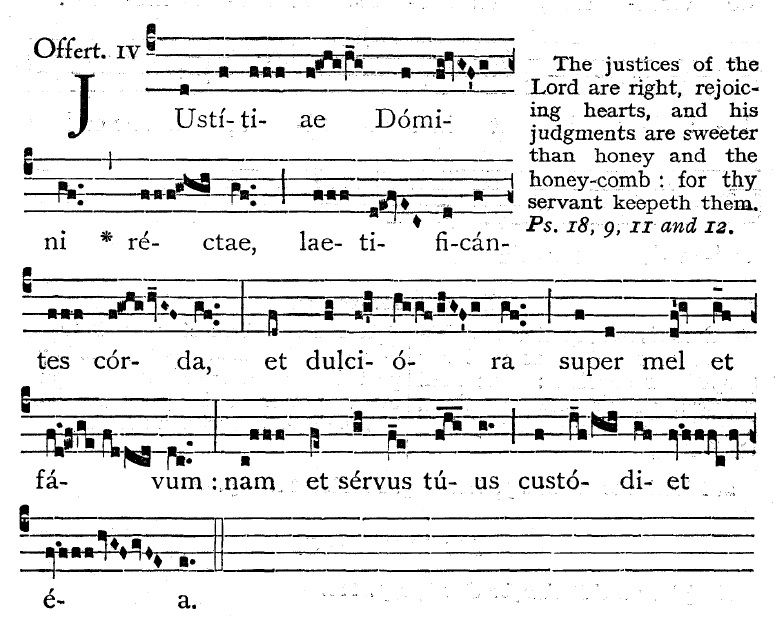Translations Woes • Justitiae Offertory
-
MASS & VESPERS, 1958 is probably the most remarkable publication I've ever seen.
http://www.musicasacra.com/books/massandvespers.pdf
However, it seems that the translation for this Offertory (Justitiae) is not as good as the one in the Gregorian Missal:
Gregorian Missal:
MASS & VESPERS seems to be going off this:
Justítiæ Dómini rectæ, lætificántes corda, et judícia ejus dulcióra super mel et favum: nam et servus tuus custódit ea.
Is this perhaps a difference between the ITALA and the VULGATE ?
. . . Am I wrong?
printable file (Justitiae Offertory)
http://www.medievalist.net/psalmstxt/ps18.htm -
There seem to be cases when the traditional antiphons just don't quote the whole passage, as a sort of "clarification of the meaning so it goes with the readings" thing. Though of course they could be going off a different translation, as you say. Apparently the "Psalterium Romanum" was used in places in the Roman Missal, so maybe that's the source of the difference?
The Clementine Vulgate text is:
"Justitiæ Domini rectæ, lætificantes corda;
præceptum Domini lucidum, illuminans oculos.
Timor Domini sanctus, permanens in sæculum sæculi ;
judicia Domini vera, justificata in semetipsa,
desiderabilia super aurum et lapidem pretiosum multum,
et dulciora super mel et favum.
Etenim servus tuus custodit ea ;
in custodiendis illis retributio multa.
So the bits it's quoting, it's quoting perfectly accurately.
The latter translation is not Nova Vulgata, because it says:
"Iustitiae Domini rectae, laetificantes corda,
praeceptum Domini lucidum, illuminans oculos.
Timor Domini mundus, permanens in saeculum saeculi;
iudicia Domini vera, iusta omnia simul,
desiderabilia super aurum et lapidem pretiosum multum,
et dulciora super mel et favum stillantem.
Etenim servus tuus eruditur in eis;
in custodiendis illis retributio multa."
A commentary on the Psalms by St. Augustine has that "nam" servant thing going, though, so I suspect you're right about it being from the Old Latin/Italic translation. -
Both translations of the chant have problems. This is how it should be rendered:
“The ordinances of the Lord are direct, gladdening hearts and sweeter than honey and comb, for your servant too will observe them.”
St. Jerome was the first to use iustitiae in the plural, giving it the sense of “ordinances, decrees.”
“Nam et” is a literal (though here incorrect) translation of the Greek “kai gar”. “Kai gar,” in turn, is the translation of the Hebrew “gam”. Both “kai gar” and “gam” can also be translated into Latin with “etenim”—and indeed, and what’s more. “Nam et” is not an accurate translation of “gam.”
As for custodit, the Septuagint reads phulassei, present tense. I’m not sure whether there is some basis for the future “custodiet” anywhere. The New Vulgate is a literal translation of what the Hebrew is currently believed to say. -
The "versio Romana" of the Roman Missal is apparently traditionally said to be from St. Jerome's first go-round of translating the Psalms, which he did from Hebrew texts (maybe different texts than ones he got later), the Septuagint (maybe different Septuagint translations than he got later), and the Old Latin and Itala translations (about which we know little, except that the few Latin-speaking Roman Christians were ferociously attached to them and resisted changing them). He knew better than to change certain things too much, because he did that translation when he was still living in Rome.
The thing is, we know his later translations of the Bible (which became the Vulgate) were very Eastern-influenced (and of course, he came from Dalmatia himself) and very post-Jamnian-Jewish-influenced. (And he was out of reach of Roman mobs, living all the way over in Bethlehem.)
The earlier texts of the Septuagint, the pre-Jamnian Hebrew texts, and the Old Latin/Itala translations often seem to have leaned in a different way, interpreted more like what Judaism was like for a Jew in Jesus' day -- before Christianity came along, the Temple was destroyed, and Jamnia encouraged Jews to circle the wagons and distrust anything that came out of the same diaspora they were living in. The Old Latin translations were said to be clumsy, but preserved a lot of this mindset and tradition of interpretation of the OT. (And they were redolent with the amateur, working-class slave, spirit of really early Christianity, as slightly later Early Christians tell us.)
We also have to consider that though the Church encourages Biblical scholarship and going back to the source, she's never said that only the source texts are inspired. So even if an approved Bible translation is abandoned in the end, "what was holy once is holy still". The Biblical commentaries based on the old translation are still valid, and the Roman Missal still used the old translation in bits. So clearly, we are not to regard those bits which were kept as useless and wrong. People went to a lot of trouble in various ages to keep them for us. -
I appreciate these thoughts.
Welcome to the MusicaSacra Forum!
To participate in the discussions on Catholic church music, sign in or register as a forum member, The forum is a project of the Church Music Association of America.
Categories
- All Discussions21,288
- General Music Discussion8,300
- Job Openings217
- Management of Music Programs852
- Choral Matters534
- Church Documents and Rubrics528
- CMAA Notes304
- Events731
- For Newcomers: Read First26
- Sacred Polyphony550
- Hymnody875
- Gregorian Chant: General2,712
- ↳ Graduale Romanum and Liber Usualis370
- ↳ Graduale Simplex60
- ↳ Semiology64
- Vernacular Plainsong698
- Anglican Use and Anglican Chant68
- Organ, Other Instruments and Repertoire438
- New Composition/Works in Progress1,303
- Recordings234
- Music for Hispanic Ministry162
- Music Education: Children213
- Music Education: General222
- News Items245
- Positions Wanted3
- General Discussion: Catholicism740
- Amusements177
- General Discussion1,037
- Opinions119

